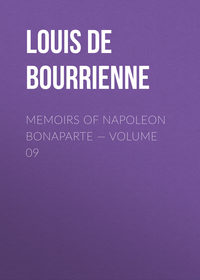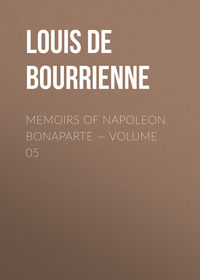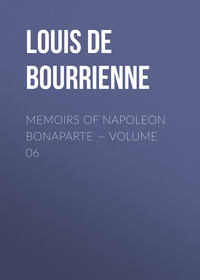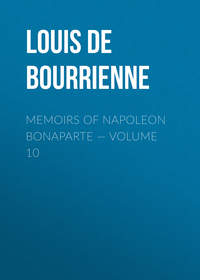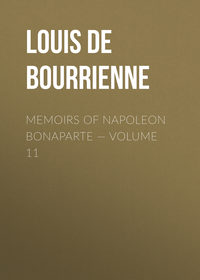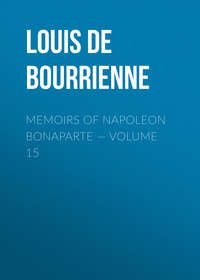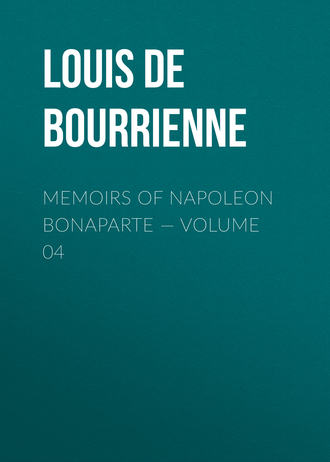 полная версия
полная версияMemoirs of Napoleon Bonaparte — Volume 04
He did not esteem mankind, whom, indeed, he despised more and more in proportion as he became acquainted with them. In him this unfavourable opinion of human nature was justified by many glaring examples of baseness, and he used frequently to repeat, "There are two levers for moving men,—interest and fear." What respect, indeed, could Bonaparte entertain for the applicants to the treasury of the opera? Into this treasury the gaming-houses paid a considerable sum, part of which went to cover the expenses of that magnificent theatre. The rest was distributed in secret gratuities, which were paid on orders signed by Duroc. Individuals of very different characters were often seen catching the little door in the Rue Rameau. The lady who was for a while the favourite of the General-in-Chief in Egypt, and whose husband was maliciously sent back by the English, was a frequent visitor to the treasury. On an occasion would be seen assembled there a distinguished scholar and an actor, a celebrated orator and a musician; on another, the treasurer would have payments to make to a priest, a courtesan, and a cardinal.
One of Bonaparte's greatest misfortunes was, that he neither believed in friendship not felt the necessity of loving. How often have I heard him say, "Friendship is but a name; I love nobody. I do not even love my brothers. Perhaps Joseph, a little, from habit and because he is my elder; and Duroc, I love him too. But why? Because his character pleases me. He is stern and resolute; and I really believe the fellow never shed a tear. For my part, I know very well that I have no true friends. As long as I continue what I am, I may have as many pretended friends as I please. Leave sensibility to women; it is their business. But men should be firm in heart and in purpose, or they should have nothing to do with war or government."
In his social relations Bonaparte's temper was bad; but his fits of ill- humour passed away like a cloud, and spent themselves in words. His violent language and bitter imprecations were frequently premeditated. When he was going to reprimand any one he liked to have a witness present. He would then say the harshest things, and level blows against which few could bear up. But he never gave way to those violent ebullitions of rage until be acquired undoubted proofs of the misconduct of those against whom they were directed. In scenes of this sort I have frequently observed that the presence of a third person seemed to give him confidence. Consequently, in a 'tête-à-tête' interview, any one who knew his character, and who could maintain sufficient coolness and firmness, was sure to get the better of him. He told his friends at St. Helena that he admitted a third person on such occasions only that the blow might resound the farther. That was not his real motive, or the better way would have been to perform the scene in public. He had other reasons. I observed that he did not like a 'tête-à-tête'; and when he expected any one, he would say to me beforehand, "Bourrienne, you may remain;" and when any one was announced whom he did not expect, as a minister or a general, if I rose to retire he would say in a half- whisper, "Stay where you are." Certainly this was not done with the design of getting what he said reported abroad; for it belonged neither to my character nor my duty to gossip about what I had heard. Besides, it may be presumed, that the few who were admitted as witnesses to the conferences of Napoleon were aware of the consequences attending indiscreet disclosures under a Government which was made acquainted with all that was said and done.
Bonaparte entertained a profound dislike of the sanguinary men of the Revolution, and especially of the regicides. He felt, as a painful burden, the obligation of dissembling towards them. He spoke to me in terms of horror of those whole he called the assassins of Louis XVI, and he was annoyed at the necessity of employing them and treating them with apparent respect. How many times has he not said to Cambacérès, pinching him by the ear, to soften, by that habitual familiarity, the bitterness of the remark, "My dear fellow, your case is clear; if ever the Bourbons come back you will be hanged!" A forced smile would then relax the livid countenance of Cambacérès, and was usually the only reply of the Second Consul, who, however, on one occasion said in my hearing, "Come, come, have done with this joking."
One thing which gave Bonaparte great pleasure when in the country was to see a tall, slender woman, dressed in white, walking beneath an alley of shaded trees. He detested coloured dresses, and especially dark ones. To fat women he had an invincible antipathy, and he could not endure the sight of a pregnant woman; it therefore rarely happened that a female in that situation was invited to his parties. He possessed every requisite for being what is called in society an agreeable man, except the will to be so. His manner was imposing rather than pleasing, and those who did not know him well experienced in his presence an involuntary feeling of awe. In the drawing-room, where Josephine did the honours with so much grace and affability, all was gaiety and ease, and no one felt the presence of a superior; but on Bonaparte's entrance all was changed, and every eye was directed towards him, to read his humour in his countenance, whether he intended to be silent or talkative, dull or cheerful.
He often talked a great deal, and sometimes a little too much; but no one could tell a story in a more agreeable and interesting way. His conversation rarely turned on gay or humorous subjects, and never on trivial matters. He was so fond of argument that in the warmth of discussion it was easy to draw from him secrets which he was most anxious to conceal. Sometimes, in a small circle, he would amuse himself by relating stories of presentiments and apparitions. For this he always chose the twilight of evening, and he would prepare his hearers for what was coming by some solemn remark. On one occasion of this kind he said, in a very grave tone of voice, "When death strikes a person whom we love, and who is distant from us, a foreboding almost always denotes the event, and the dying person appears to us at the moment of his dissolution." He then immediately related the following anecdote: "A gentleman of the Court of Louis XIV. was in the gallery of Versailles at the time that the King was reading to his courtiers the bulletin of the battle of Friedlingen gained by Villars. Suddenly the gentleman saw, at the farther end of the gallery, the ghost of his son, who served under Villars. He exclaimed, 'My son is no more!' and next moment the King named him among the dead."
When travelling Bonaparte was particularly talkative. In the warmth of his conversation, which was always characterised by original and interesting ideas, he sometimes dropped hints of his future views, or, at least, he said things which were calculated to disclose what he wished to conceal. I took the liberty of mentioning to him this indiscretion, and far from being offended, he acknowledged his mistake, adding that he was not aware he had gone so far. He frankly avowed this want of caution when at St. Helena.
When in good humour his usual tokens of kindness consisted in a little rap on the head or a slight pinch of the ear. In his most friendly conversations with those whom he admitted into his intimacy he would say, "You are a fool"—"a simpleton"—"a ninny"—"a blockhead." These, and a few other words of like import, enabled him to vary his catalogue of compliments; but he never employed them angrily, and the tone in which they were uttered sufficiently indicated that they were meant in kindness.
Bonaparte had many singular habits and tastes. Whenever he experienced any vexation, or when any unpleasant thought occupied his mind, he would hum something which was far from resembling a tune, for his voice was very unmusical. He would, at the same time, seat himself before the writing-table, and swing back in his chair so far that I have often been fearful of his falling.
He would then vent his ill-humour on the right arm of his chair, mutilating it with his penknife, which he seemed to keep for no other purpose. I always took care to keep good pens ready for him; for, as it was my business to decipher his writing, I had a strong interest in doing what I could to make it legible.
The sound of bells always produced in Bonaparte pleasurable sensations, which I could never account for. When we were at Malmaison, and walking in the alley leading to the plain of Ruel, how many times has the bell of the village church interrupted our most serious conversations!
He would stop, lest the noise of our footsteps should drown any portion of the delightful sound. He was almost angry with me because I did not experience the impressions he did. So powerful was the effect produced upon him by the sound of these bells that his voice would falter as he said, "Ah! that reminds me of the first years I spent at Brienne! I was then happy!" When the bells ceased he would resume the course of his speculations, carry himself into futurity, place a crown on his head, and dethrone kings.
Nowhere, except on the field of battle, did I ever see Bonaparte more happy than in the gardens of Malmaison. At the commencement of the Consulate we used to go there every Saturday evening, and stay the whole of Sunday, and sometimes Monday. Bonaparte used to spend a considerable part of his time in walking and superintending the improvements which he had ordered. At first he used to make excursions about the neighbourhood, but the reports of the police disturbed his natural confidence, and gave him reason to fear the attempts of concealed royalist partisans.
During the first four or five days that Bonaparte spent at Malmaison he amused himself after breakfast with calculating the revenue of that domain. According to his estimates it amounted to 8000 francs. "That is not bad!" said he; "but to live here would require an income of 30,000 livres!" I could not help smiling to see him seriously engaged in such a calculation.
Bonaparte had no faith in medicine. He spoke of it as an art entirely conjectural, and his opinion on this subject was fired and incontrovertible. His vigorous mind rejected all but demonstrative proofs.
He had little memory for proper names, words, or dates, but he had a wonderful recollection of facts and places. I recollect that, on going from Paris to Toulon, he pointed out to me ten places calculated for great battles, and he never forgot them. They were memoranda of his first youthful journeys.
Bonaparte was insensible to the charms of poetic harmony. He had not even sufficient ear to feel the rhythm of poetry, and he never could recite a verse without violating the metre; yet the grand ideas of poetry charmed him. He absolutely worshipped Corneille; and, one day, after having witnessed a performance of 'Cinna', he said to me, "If a man like Corneille were living in my time I would make him my Prime Minister. It is not his poetry that I most admire; it is his powerful understanding, his vast knowledge of the human heart, and his profound policy!" At St. Helena he said that he would have made Corneille a prince; but at the time he spoke to me of Corneille he had no thought of making either princes or kings.
Gallantry to women was by no means a trait in Bonaparte's character. He seldom said anything agreeable to females, and he frequently addressed to them the rudest and most extraordinary remarks. To one he would say, "Heavens, how red your elbows are!" To another, "What an ugly headdress you have got!" At another time he would say, "Your dress is none of the cleanest….. Do you ever change your gown? I have seen you in that twenty times!" He showed no mercy to any who displeased him on these points. He often gave Josephine directions about her toilet, and the exquisite taste for which she was distinguished might have helped to make him fastidious about the costume of other ladies. At first he looked to elegance above all things: at a later period he admired luxury and splendour, but he always required modesty. He frequently expressed his disapproval of the low-necked dresses which were so much in fashion at the beginning of the Consulate.
Bonaparte did not love cards, and this was very fortunate for those who were invited to his parties; for when he was seated at a card-table, as he sometimes thought himself obliged to be, nothing could exceed the dulness of the drawing-room either at the Luxembourg or the Tuileries. When, on the contrary, he walked about among the company, all were pleased, for he usually spoke to everybody, though he preferred the conversation of men of science, especially those who had been with him in in Egypt; as for example, Monge and Berthollet. He also liked to talk with Chaptal and Lacépède, and with Lemercier, the author of 'Agamemnon'.
Bonaparte was seen to less advantage in a drawing-room than at the head of his troops. His military uniform became him much better than the handsomest dress of any other kind. His first trials of dress-coats were unfortunate. I have been informed that the first time he wore one he kept on his black cravat. This incongruity was remarked to him, and he replied, "So much the better; it leaves me something of a military air, and there is no harm in that." For my own part, I neither saw the black cravat nor heard this reply.
The First Consul paid his own private bills very punctually; but he was always tardy in settling the accounts of the contractors who bargained with Ministers for supplies for the public service. He put off these payments by all sorts of excuses and shufflings. Hence arose immense arrears in the expenditure, and the necessity of appointing a committee of liquidation. In his opinion the terms contractor and rogue were synonymous. All that he avoided paying them he regarded as a just restitution to himself; and all the sums which were struck off from their accounts he regarded as so much deducted from a theft. The less a Minister paid out of his budget the more Bonaparte was pleased with him; and this ruinous system of economy can alone explain the credit which Decrès so long enjoyed at the expense of the French navy.
On the subject of religion Bonaparte's ideas were very vague. "My reason," said he, "makes me incredulous respecting many things; but the impressions of my childhood and early youth throw me into uncertainty." He was very fond of talking of religion. In Italy, in Egypt, and on board the 'Orient' and the 'Muiron', I have known him to take part in very animated conversations on this subject.
He readily yielded up all that was proved against religion as the work of men and time: but he would not hear of materialism. I recollect that one fine night, when he was on deck with some persons who were arguing in favour of materialism, Bonaparte raised his hand to heaven and, pointing to the stars, said, "You may talk as long as you please, gentlemen, but who made all that?" The perpetuity of a name in the memory of man was to him the immortality of the soul. He was perfectly tolerant towards every variety of religious faith.
Among Bonaparte's singular habits was that of seating himself on any table which happened to be of a suitable height for him. He would often sit on mine, resting his left arm on my right shoulder, and swinging his left leg, which did not reach the ground; and while he dictated to me he would jolt the table so that I could scarcely write.
Bonaparte had a great dislike to reconsider any decision, even when it was acknowledged to be unjust. In little as well as in great things he evinced his repugnance to retrograde. An instance of this occurred in the affair of General Latour-Foissac. The First Consul felt how much he had wronged that general; but he wished some time to elapse before he repaired his error. His heart and his conduct were at variance; but his feelings were overcome by what he conceived to be political necessity. Bonaparte was never known to say, "I have done wrong:" his usual observation was, "I begin to think there is something wrong."
In spite of this sort of feeling, which was more worthy of an ill- humoured philosopher than the head of a government, Bonaparte was neither malignant nor vindictive. I cannot certainly defend him against all the reproaches which he incurred through the imperious law of war and cruel necessity; but I may say that he has often been unjustly accused. None but those who are blinded by fury will call him a Nero or a Caligula. I think I have avowed his faults with sufficient candour to entitle me to credit when I speak in his commendation; and I declare that, out of the field of battle, Bonaparte had a kind and feeling heart. He was very fond of children, a trait which seldom distinguishes a bad man. In the relations of private life to call him amiable would not be using too strong a word, and he was very indulgent to the weakness of human nature. The contrary opinion is too firmly fixed in some minds for me to hope to root it out. I shall, I fear, have contradictors, but I address myself to those who look for truth. To judge impartially we must take into account the influence which time and circumstances exercise on men; and distinguish between the different characters of the Collegian, the General, the Consul, and the Emperor.
CHAPTER XXIX
1800.
Bonaparte's laws—Suppression of the festival of the 21st of January—Officials visits—The Temple—Louis XVI. and Sir Sidney Smith—Peculation during the Directory—Loan raised—Modest budget —The Consul and the Member of the Institute—The figure of the Republic—Duroc's missions—The King of Prussia—The Emperor Alexander—General Latour-Foissac—Arbitrary decree—Company of players for Egypt—Singular ideas respecting literary property— The preparatory Consulate—The journals—Sabres and muskets of honour—The First Consul and his Comrade—The bust of Brutus— Statues in the gallery of the Tuileries—Sections of the Council of State—Costumes of public functionaries—Masquerades—The operaballs—Recall of the exiles.
It is not my purpose to say much about the laws, decrees, and 'Senatus- Consultes', which the First Consul either passed, or caused to be passed, after his accession to power, what were they all, with the exception of the Civil Code? The legislative reveries of the different men who have from time to time ruled France form an immense labyrinth, in which chicanery bewilders reason and common sense; and they would long since have been buried in oblivion had they not occasionally served to authorise injustice. I cannot, however, pass over unnoticed the happy effect produced in Paris, and throughout the whole of France, by some of the first decisions of the Consuls. Perhaps none but those who witnessed the state of society during the reign of Terror can fully appreciate the satisfaction which the first steps towards the restoration of social order produced in the breasts of all honest men. The Directory, more base and not less perverse than the Convention, had retained the horrible 21st of January among the festivals of the Republic. One of Bonaparte's first ideas on attaining the possession of power was to abolish this; but such was the ascendency of the abettors of the fearful event that he could not venture on a straightforward course. He and his two colleagues, who were Sieyès and Roger Ducos, signed, on the 5th Nivôse, a decree, setting forth that in future the only festivals to be celebrated by the Republic were the 1st Vendemiaire and the 14th of July, intending by this means to consecrate provisionally the recollection of the foundation of the Republic and of liberty.
All was calculation with Bonaparte. To produce effect was his highest gratification. Thus he let slip no opportunity of saying or doing things which were calculated to dazzle the multitude. While at the Luxembourg, he went sometimes accompanied by his 'aides de camp' and sometimes by a Minister, to pay certain official visits. I did not accompany him on these occasions; but almost always either on his return, after dinner, or in the evening, he related to me what he had done and said. He congratulated himself on having paid a visit to Daubenton, at the Jardin des Plantes, and talked with great self-complacency of the distinguished way in which he had treated the contemporary of Buffon.
On the 24th Brumaire he visited the prisons. He liked to make these visits unexpectedly, and to take the governors of the different public establishments by surprise; so that, having no time to make their preparations, he might see things as they really were. I was in his cabinet when he returned, for I had a great deal of business to go through in his absence. As he entered he exclaimed, "What brutes these Directors are! To what a state they have brought our public establishments! But, stay a little! I will put all in order. The prisons are in a shockingly unwholesome state, and the prisoners miserably fed. I questioned them, and I questioned the jailers, for nothing is to be learned from the superiors. They, of course, always speak well of their own work! When I was in the Temple I could not help thinking of the unfortunate Louis XVI. He was an excellent man, but too amiable, too gentle for the times. He knew not how to deal with mankind! And Sir Sidney Smith! I made them show me his apartment. If the fools had not let him escape I should have taken St. Jean d'Acre! There are too many painful recollections connected with that prison! I will certainly have it pulled down some day or other! What do you think I did at the Temple? I ordered the jailers' books to be brought to me, and finding that some hostages were still in confinement I liberated them. 'An unjust law,' said I, 'has deprived you of liberty; my first duty is to restore it to you.' Was not this well done, Bourrienne? "As I was, no less than Bonaparte himself, an enemy to the revolutionary laws, I congratulated him sincerely; and he was very sensible to my approbation, for I was not accustomed to greet him with "Good; very good," on all occasions. It is true, knowing his character as I did, I avoided saying anything that was calculated to offend him; but when I said nothing, he knew very well how to construe my silence. Had I flattered him I should have continued longer in favour.
Bonaparte always spoke angrily of the Directors he had turned off. Their incapacity disgusted and astonished him. "What simpletons! what a government!" he would frequently exclaim when he looked into the measures of the Directory. "Bourrienne," said he, "can you imagine anything more pitiable than their system of finance? Can it for a moment be doubted that the principal agents of authority daily committed the most fraudulent peculations? What venality! what disorder! what wastefulness! everything put up for sale: places, provisions, clothing, and military, all were disposed of. Have they not actually consumed 75,000,000 in advance? And then, think of all the scandalous fortunes accumulated, all the malversations! But are there no means of making them refund? We shall see."
In these first moments of poverty it was found necessary to raise a loan, for the funds of M. Collot did not last long, and 12,000,000 were advanced by the different bankers of Paris, who, I believe, were paid by bills of the receivers-general, the discount of which then amounted to about 33 per cent. The salaries of the first offices were not very considerable, and did not amount to anything like the exorbitant stipends of the Empire.
Bonaparte's salary was fixed at 500,000 francs. What a contrast to the 300,000,000 in gold which were reported to have been concealed in 1811 in the cellars of the Tuileries!
In mentioning Bonaparte's nomination to the Institute, and his affectation in putting at the head of his proclamation his title of member of that learned body before that of General-in-Chief, I omitted to state what value he really attached to that title. The truth is that, when young and ambitious, he was pleased with the proffered title, which he thought would raise him in public estimation. How often have we laughed together when he weighed the value of his scientific titles! Bonaparte, to be sure, knew something of mathematics, a good deal of history, and, I need not add, possessed extraordinary military talent; but he was nevertheless a useless member of the Institute.


